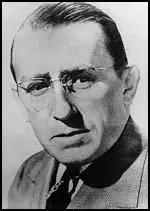Basil O'Connor

Basil O'Connor was born in Taunton, Massachusetts, on 8th January, 1892. After graduating from Harvard Law School he was admitted to the bar to practice law in 1915. He worked in New York City for the law firm Cravath & Henderson and for the next three years for Streeter & Holmes in Boston.
In 1919 O'Connor founded his own law firm in New York City, where he met Franklin D. Roosevelt and became his legal advisor. In 1924 the two men joined forces to establish their own law firm. They also founded the Georgia Warm Springs Foundation in order to raise funds to support poliomyelitis patients.
Roosevelt, a member of the Democratic Party, became Governor of New York in 1929. Roosevelt sought O'Connor's advice during the 1932 Presidential Election. O'Connor was joined by Rexford Guy Tugwell, Adolf Berle and Raymond Moley. It has been argued by Patrick Renshaw: "Politically, Tugwell was on the left with Berle on the right. Moley chaired regular meetings of the brains trust, which Samuel Rosenman and Basil O'Connor also attended. FDR was not an intellectual, but enjoyed their company and was in his element at the free-wheeling discussions which hammered out the New Deal."
It has been argued by William E. Leuchtenburg, the author of Franklin D. Roosevelt and the New Deal (1963): "They argued economic doctrine through long spring evenings at the Governor's fireside in Albany, held audiences for economists in a hotel suite in New York City, and wrangled over drafts of campaign speeches... After the election... Moley continued to serve as minister without portfolio in the months before the inauguration; he interviewed experts, assigned men to draft bills, and hammered out the legislation of the Hundred Days."
In 1934 O'Connor became the Senior Partner in the law firm O'Connor & Farber. He continued to be interested in charity work and in 1938, he joined with President Franklin D. Roosevelt to establish the National Foundation for Infantile Paralysis, which focused on supporting research on polio prevention and treatment.
From 1944 to 1949 O'Connor was Chairman and President of the American Red Cross and from 1945 to 1950 he was Chairman of the International Federation of Red Cross and Red Crescent Societies. In 1958 O'Connor received the Mary Woodard Lasker Award for Public Service in recognition of his efforts in the fight against polio.
Basil O'Connor died in Phoenix, Arizona, on 9th March, 1972.
Primary Sources
(1) William E. Leuchtenburg, Franklin D. Roosevelt and the New Deal (1963)
They argued economic doctrine through long spring evenings at the Governor's fireside in Albany, held audiences for economists in a hotel suite in New York City, and wrangled over drafts of campaign speeches... After the election... Moley continued to serve as minister without portfolio in the months before the inauguration; he interviewed experts, assigned men to draft bills, and hammered out the legislation of the Hundred Days.
